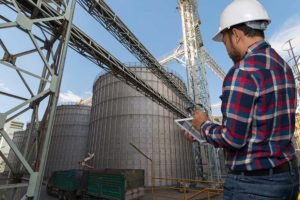Disclaimer: The information on our website is provided for general information purposes only. We make no representations or warranties of any kind, express or implied, about the completeness, accuracy, reliability, suitability or availability with respect to the website or the information contained on our website for any purpose. Any reliance on such information is therefore strictly at your own risk and we are not liable for any damages or losses arising out of or resulting from your reliance on any information contained on our website.
An agricultural manager works very closely with farmers. Their primary duty is to coordinate crop production for corporations, cooperatives, or other owners. They manage and evaluate agricultural factors such as disease, market conditions, soil conditions, weather, production needs, and sometimes even federal programs that are available.
Watch a video to learn what an agricultural manager does:
How to Become an Agricultural Manager
Agricultural managers usually are experienced farmers or ranchers that have a minimum of a high school diploma. Though not required, many agricultural managers are beginning to take college courses or earn bachelors degrees at local universities or state colleges. Coursework or degrees usually include agriculture, farm management, agronomy, or botany. You also learn about the newest technology, farming methods, crop or livestock diseases, and the care of crops.
Job Description of an Agricultural Manager

Agricultural managers are responsible for numerous tasks and play a major role in the production and distribution of crops and livestock. They must have strong communication skills because they are often conferring with purchasers and sellers. They also assist in the coordination of agricultural needs and activities such as procedural changes, storage, grading, and logistical processes.They negotiate with banks or other credit lenders to get the financing needed for purchasing equipment, crops, grain, and livestock.
Agricultural managers must be detailed oriented, often times they are recording information during the day on processes, agricultural practices, stock, inventory, and reports. They prepare financial and operational documents and analyze market conditions. However, they are also on site looking at the maintenance of machines, analyzing soils, determining correct fertilizers, and ensuring production is on schedule.
Locations and employment opportunities vary for agricultural managers. Some work on farms, however others may work at nurseries, greenhouses, or various agricultural production sites. Agricultural managers work full time and often work irregular hours and more than 40 hours a week, especially during the fall and spring months thus these are planting and harvesting times. Agricultural manager can work in very harsh conditions when out in the field due to weather changes. However, during slow times they are working in an office marketing their crops or planning for the next season.
Free Teacher and Student Resources
Teachers: The American Farm Bureau Foundation for Agriculture offers free agricultural resources and lesson plans.
Free Agriculture Online Course
Wageningen University and Research offers a free Sustainable Food Security: The Value of Systems Thinking course on EdX.org. Also, there is an option to pay a small fee receive a verified certificate upon completion of the course. By taking this course, you’ll learn:
- The concept of environmental sustainability and identify the main issues associated with food production.
- The basics of systems thinking and understand how the different aspects of a system influence one another and how a system itself is affected by its context.
- The relevance of crop and livestock productivity for environmental sustainability.
- The environmental indicators and how to measure the environmental impact of food production at farm, village or regional level
- Decision-making and life cycle assessment.
- Helpful tools and their strong and weak points.
Career Video Transcript
For some, the call of the great outdoors is constant. Some of those who hear its call choose careers as farmers, ranchers, or other agricultural managers. These workers have the privilege of managing crops and livestock, from seed to tomato, from calf to bull. For a more hands-on approach to nurturing our land and its animals, you may want to be a farmer or rancher. These professionals are often their own bosses, overseeing a family business by raising food, servicing machinery, and doing their own marketing. Meanwhile, agricultural managers are more likely to aid in food production by hiring, supervising, and budgeting for a farm or group of farms, rather than doing the demanding physical labor of farm work themselves.
Agricultural managers are also more likely to work for a corporation or the remote owners of an agricultural establishment. As a farmer, rancher, or agricultural manager, you will have long hours, working from sunrise to sunset in the harvest season. If raising livestock, you will need to tend to your flock every day. Agricultural workers must truly love working with nature and animals for the level of dedication required of this occupation. While many farmer, ranchers, and other agricultural managers gain valuable experience and skills from growing up in a farming family, more and more farmers are seeking out agricultural college degrees that enhance their understanding of plant and animal diseases, weather patterns, and technological advances in pesticides and other machinery.
From year to year, members of this profession often experience fluctuations in salary depending on the success of their crop and livestock. In the long-term, a decline in farming, ranching, and other agricultural managing jobs is projected as technology continues to make farming more efficient. However, no one will ever truly be able to take the ‘farmer’ out of the farm.
Article Citations
- Bureau of Labor Statistics, U.S. Department of Labor, Occupational Outlook Handbook, Farmers, Ranchers, and other Agricultural Managers.
- The career video is in the public domain from the U. S. Department of Labor, Employment and Training Administration.

